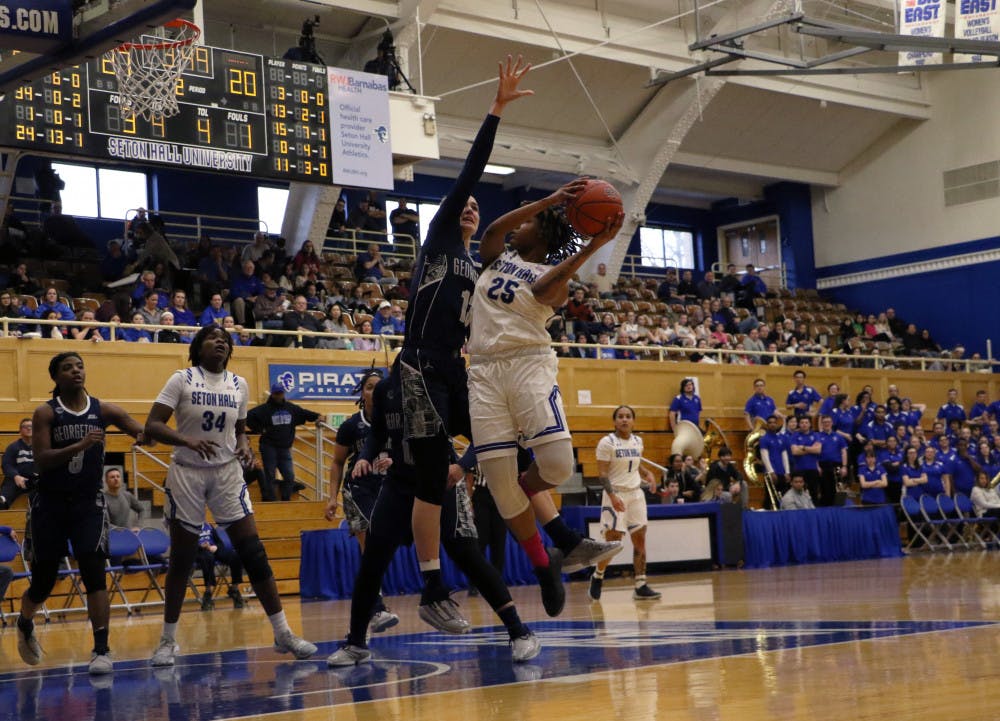Signs warning students of foods containg nuts are now prominently displayed in the Caf to notify students of potential allergens in food after a freshman nearly died from an allergic reaction last week.
Chelsea Scalzo, a freshman criminal justice major, administered an Epi-pen shot to Ariana Caprio, a freshman business major, which essentially saved Caprio's life.
"If it wasn't for Ms. Scalzo, we wouldn't be seeing Ariana today," Frank Caprio, Ariana's father, said.
According to Ariana Caprio, she did not see a sign in the Caf cautioning that the rice may contain nuts, which she had been assured would be there by a dietician at freshman orientation.
Alfred Frungillo, chairman of Gourmet Dining Services, said that GDS has made everything completely nut free, and anything containing a nut product will be moved to one section of the Caf. He also said that a dietician is available on staff for anybody who has special dining needs.
GDS has, however, made an effort to notify those using the Caf of potential allergens in food. Many students have noticed the new signs, saying "Caution! Allergies alert," including freshman Melissa Cotreau.
"They should have been there before. We all know how prevalent food allergies are nowadays," Cotreau said. "When I first got here I was surprised that there weren't signs anywhere."
GDS distributed fliers Tuesday evening to everyone that swiped into the Caf.
The flier addressed those who do and do not have allergies, giving tips for each.
After ingesting the pine nuts, (Ariana) Caprio ran back to her dorm, Aquinas Hall, to retrieve her Epi-pen.
Scalzo said she followed Caprio back to Aquinas and instructed the Aquinas Desk Assistant to call 911 after finding Caprio on the lobby floor. She also administered an Epi-pen injection to Caprio.
According to Scalzo, she asked the Aquinas Resident Assistant who was present to retrieve Benadryl from Caprio's room but was told that the RAs could not give medical help to students.
According to Tara Hart, director of Housing and Residence Life, the RAs role in any emergency situation is to call 911.
"Our training with RA's of course tells them that in a life threatening situation they should call 911," Hart said. "We also ask that they try to ensure the safety of all parties, but not to endanger themselves. RA's do not undergo medical training, since their role is one of assist and referral."
According to Dominick Boyle, president of the South Orange Rescue Squad and Emergency Medical Technician, it took the squad four minutes to get to campus. He also said that the St. Barnabas Hospital paramedics arrived in "less than the average time" it usually takes them.
"We got the call, jumped in the ambulance, and left immediately," Boyle said. "The response time of our ambulance and their ambulance could not be better."
Boyle, who was on the call, said that he and his crew member did what they were allowed to do immediately which including providing Caprio with oxygen and clearing her airway. He also said they are limited in the medical treatment they can administer.
Boyle and Kurt Gibson, captain of the South Orange Rescue Squad and another EMT, stressed that once a patient is stabilized, he or she will be transported to the hospital. They also said having a fellow student transport someone suffering with a reaction as severe as Caprio's would have been a "big mistake."
"She probably would've died if they had transported her to the hospital in the pouring rain," Gibson said. "She did not have a full dose of Epi-pen because the first Epi-pen shot was not administered properly."
Frank Caprio said he did not receive a phone call notifying him about his daughter from anyone but Scalzo.
"I have to put all the calls out," Frank Caprio said. "You'd think there was some kind of protocol."
According to Mary Elizabeth Costello, director of Health Services, if a student is transported to the hospital, it is the hospital's responsibility to notify the parents because they would have the "most current and accurate information."
According to Boyle, in a case such as this, not much can be done to help besides giving an Epi-pen.
"There's nothing much else to do except make sure help is on the way," Boyle said.
Jessica Sutcliffe can be reached at jessica.sutcliffe@student.shu.edu.





